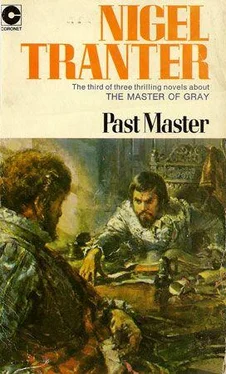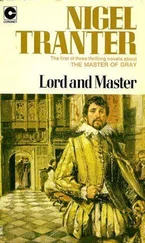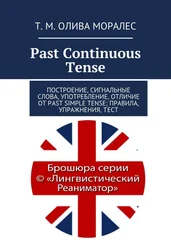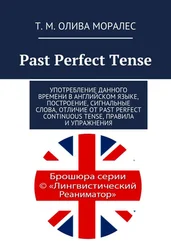Nigel Tranter - Past Master
Здесь есть возможность читать онлайн «Nigel Tranter - Past Master» весь текст электронной книги совершенно бесплатно (целиком полную версию без сокращений). В некоторых случаях можно слушать аудио, скачать через торрент в формате fb2 и присутствует краткое содержание. Жанр: Исторические приключения, на английском языке. Описание произведения, (предисловие) а так же отзывы посетителей доступны на портале библиотеки ЛибКат.
- Название:Past Master
- Автор:
- Жанр:
- Год:неизвестен
- ISBN:нет данных
- Рейтинг книги:5 / 5. Голосов: 1
-
Избранное:Добавить в избранное
- Отзывы:
-
Ваша оценка:
- 100
- 1
- 2
- 3
- 4
- 5
Past Master: краткое содержание, описание и аннотация
Предлагаем к чтению аннотацию, описание, краткое содержание или предисловие (зависит от того, что написал сам автор книги «Past Master»). Если вы не нашли необходимую информацию о книге — напишите в комментариях, мы постараемся отыскать её.
Past Master — читать онлайн бесплатно полную книгу (весь текст) целиком
Ниже представлен текст книги, разбитый по страницам. Система сохранения места последней прочитанной страницы, позволяет с удобством читать онлайн бесплатно книгу «Past Master», без необходимости каждый раз заново искать на чём Вы остановились. Поставьте закладку, и сможете в любой момент перейти на страницу, на которой закончили чтение.
Интервал:
Закладка:
Few here were indeed to take fears seriously now. Most people there at Leith Links went slightly mad, in their relief, laughing, singing and dancing. Some even remembered their previous praying, and one or two went so far as to get down on their knees on the grass and thank the Kirk's God for this happy reward for their valour and petitions – which reminded Patrick to send a messenger to inform Andrew Melville's company of the changed situation.
The King refused to be impressed or lulled by die general jollification. That Devil-possessed man Frances might be yammering at the door of Holyroodhouse, or planning to take over the castle that lacked its garrison, he claimed. Nothing would do but that they hasten back to Edinburgh forthwith. The problems of getting the excited and now carefree crowd in hand again, of collecting the missing Kirk contingent, and of re-establishing connection with Bargany, did not concern him. Patrick must see to that.
Patrick pointed out that the threat from the sea, which presumably was behind this business of Bothwell, was still to be faced. He proposed that the cannon and their crews should be left to take up a good position guarding the entry to the harbour of Leith, to prevent a landing, and that the Kirk's leaders suitably instigate their followers in the port to rise in arms to defend the town. Melville could see to that and then come on after the King to Edinburgh. Meantime fast couriers should be sent off to the south to try to find Lord Home and Scott of Buccleuch, to inform them of Bothwell's movements. Home of Linthill, Logan's messenger, had told Patrick that he understood his chief and Buccleuch to be hurrying north, on hearing of Bothwell's original sortie. By this time they might not be far from Edinburgh. They might just possibly catch Bothwell between them.
All this took longer to arrange than it ought to have done, against the holiday mood of the vast majority; but presently the faces of most of the host were turned towards the Capital, whilst on in front making no attempt to linger with the many, Morton's Douglases with the small remainder of the mounted men and courtiers, rode hard and fast, and, strangely, in the lead and most urgent, was now the newly victorious King of Scots.
Another line of battle, another confrontation of armed forces -this time on the long ridge of Edmonstone, south of Edinburgh and near to Dalkeith, in Morton's territory indeed, and much more the traditional battlefield than Leith Links. More professional and military, too, the loyalist array. The King's hard-riding party could see them fined up along the ridge in reassuringly solid-looking formation as they themselves rode out of the valley behind Craigmillar, somewhat wearily. That these others up above must be a deal more weary did not strike all. These were Home's and Buccleuch's men – not the main force, but a strong detachment of perhaps a thousand horse under the Lord Home himself, who had hastened up from the Borders after Bothwell, and had now, almost by accident, come face to face with their quarry as he returned south towards his own main army.
Bothwell, it seemed, had not in fact designed to attack Edinburgh. Now he stood at bay on this flat ridge of Edmonstone, so near where greater battles had been fought earlier in that troubled century, at Pinkie and Carberry, the latter indeed where his predecessor, the former Bothwell, had taken his last leave of the lovely Queen Mary nearly thirty blood-stained years before. James's company after having rejoined Bargany and his Kennedys on the Borough-muir of Edinburgh, had been brought this information, and now rode to join Lord Home.
But on this occasion, also, actual hostilities, the clash of arms, was to elude the diffident monarch. His column reinforced by another two hundred Douglases, met in Leith Loan, was barely half-way up the long sloping farmlands of Edmonstone when a convulsion seemed to seize the ranked men on the skyline. Abruptly the solid phalanx broke and scattered, chaos and confusion succeeded comforting and substantial order, shouts and trumpet-calls and clangour came thinly down on the breeze. King James drew rein in haste, only to resume his advance again, with caution, when the sounds of strife were clearly receding over the brow of the hill.
Arrival at the summit revealed no fighting, but a deal of disarray. Also an angry and discomfited Lord Home, whose greeting to his sovereign was somewhat perfunctory in consequence. Bothwell, it seemed, after having shown every sign of riding off the field, as though to continue his retiral southwards, had suddenly swung round and made a flanking attack on Home's force from the side, at speed, his manoeuvre hidden by a slight rise in the ground. Thus he had been able to bring almost his whole force to bear against only part of Home's. With sad results. A dozen men were dead – all on Home's side – more were wounded, and Home himself had had a narrow escape, so narrow indeed that his personal trumpeter, close at his side, had been captured. Surprise achieved, Bothwell had returned to his former position half a mile away. Home did not say so, but probably a glimpse of the King's force, approaching up the north side of the hill, had caused him to draw away. Added to all this distressing mishap was, apparently, the fact, vouched for on all hands, that Bothwell's men had fought shouting as slogan 'For God and the Kirk!' The enemy, clearly, was not lacking in initiative when he did not have to face artillery.
While Morton was authoritatively describing to Home how he would have dealt widi the situation, and Patrick was assessing the military possibilities, a diversion occurred. A small party, under a white flag rode out from the now familiar extended front of the Bothwell line, and came to just within hailing distance of the loyalists. A trumpet blared.
'My lord Earl of Bothwell's compliments to my Lord Home,' a voice called. 'He has, by inadvertance and chance, collected a poor cornet and his trumpet, who claims to be the property of the Lord Home. Not being in need of so sorry a fellow he returns the creature herewith, and two rose nobles in generous recoupment. If the Lord Home considers this to be insufficient indemnity, my lord requests that they meet, alone, in personal match, here between the arrays, to settle the matter.'
Out from the little party then rode, distinctly sheepishly, the missing trumpeter, towards his own folk.
King James, now feeling comparatively safe with some fifteen hundred horsemen around him, actually began to tee-hee with mirth at this sally – to the grave offence of Lord Home, who was after all his most senior and experienced soldier. Home's answer of a salvo of musket-ball shot through the white flag was probably fair enough.
'Bothwell was ever a madman,' Ludovick commented. 'What does such a caper serve?'
'It serves two purposes, I think,' Patrick answered. 'For time, first – time to observe our strength, and to assess. He is no man's fool, is Francis Hepburn Stewart. And his spirit, it seems, is nowise damped.'
'Perhaps. Should we not therefore now attack? We must outnumber him by three to one…'
'I wonder, Vicky? Contrary to the opinions of some, I am a man of peace. I am but little fonder of bloodshed than is our liege lord. It would be better to end this day without actual blows, if it may be so. And if I interpret this latest gesture of Bothwell's aright, he now intends to retire. He would not have thought of it, I believe, had he intended to attack. It allows him to leave the field with a flourish – and who would deny him that, so long as he returns south whence he came?'
'But… our task is to roundly defeat him, to bring him low, not to let him go unscathed!'
'We shall not roundly defeat him, by any means, Vicky, if he does not intend to fight. In this situation, commanding some of the finest horsemen in this land, and in open country, he has but to signal them to disperse – and that will be the end of it. With foot it is different, but cavalry in open country cannot be defeated if they choose not to fight. Home, I think, will reckon the same.'
Читать дальшеИнтервал:
Закладка:
Похожие книги на «Past Master»
Представляем Вашему вниманию похожие книги на «Past Master» списком для выбора. Мы отобрали схожую по названию и смыслу литературу в надежде предоставить читателям больше вариантов отыскать новые, интересные, ещё непрочитанные произведения.
Обсуждение, отзывы о книге «Past Master» и просто собственные мнения читателей. Оставьте ваши комментарии, напишите, что Вы думаете о произведении, его смысле или главных героях. Укажите что конкретно понравилось, а что нет, и почему Вы так считаете.












